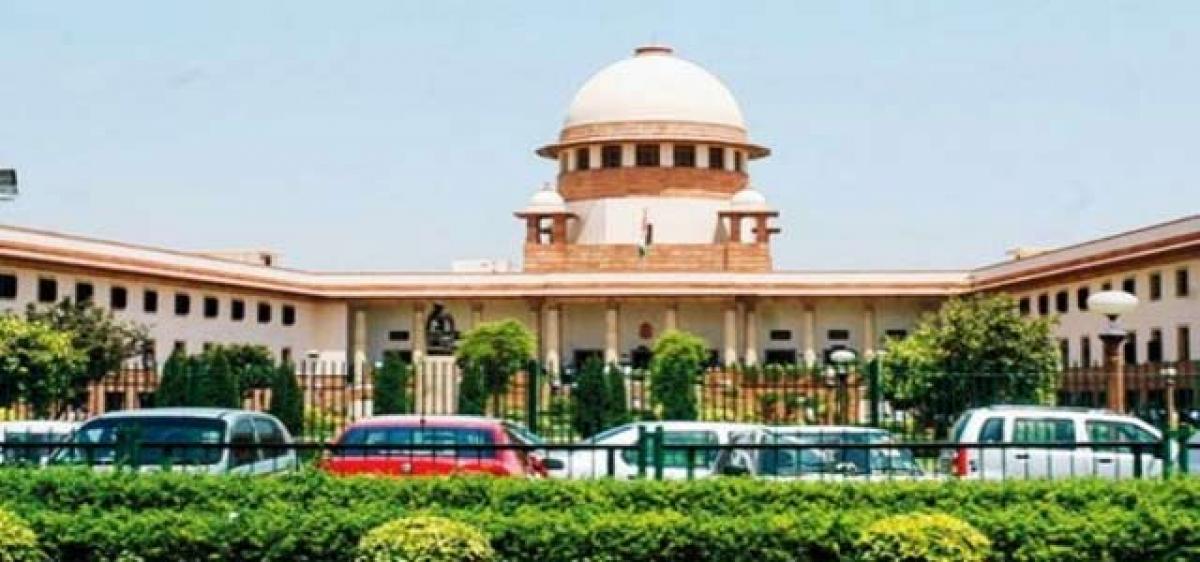Live
- All you need to know about PAN 2.0
- Akasa Air redefines travel experience with industry-first offerings
- MP: Residents stage protests against liquor shop in Indore
- Telugu Actor Shri Tej Booked for Alleged Cheating and False Promise of Marriage in Live-in Relationship
- Toyota Kirloskar Motor Celebrates 1 Lakh Urban Cruiser Hyryder on Indian Road
- MLS: New York City FC part ways with head coach Nick Cushing
- Delhi CM says Centre cutting AAP voters’ names from rolls, BJP hits back
- Hyderabad Metro Rail Phase-II Works to Begin in Old City in January 2025
- Odisha: 668 persons killed in human-elephant conflicts in last three years
- DEFENDER JOURNEYS: TO EMBARK ON ITS THIRD EDITION FROM NOVEMBER 2024
Just In

The Supreme Court on Friday referred the demonetisation decision to a five-judge Constitution Bench, but refrained from tinkering with rules the government has been announcing to tackle the cash shortage that has followed.
New Delhi: The Supreme Court on Friday referred the demonetisation decision to a five-judge Constitution Bench, but refrained from tinkering with rules the government has been announcing to tackle the cash shortage that has followed.
A bench of Chief Justice T S Thakur and Justices A M Khanwilkar and D Y Chandrachud framed the issues that the Constitution Bench would consider as it looks into the demonetisation decision.
The bench also stayed proceedings on petitions at various High Courts challenging demonetisation, and said only it would hear them.
“We find it just and proper to order withdrawal of all the writ petitions in various High Courts and all the matter will be heard by the Supreme Court.
On all the transfer petitions, we are issuing notice and ordering stay of proceedings on writ petitions in various high courts,” the bench said.
“No other courts in the country shall entertain any writ petitions relating to the demonetisation issues. We make it clear that the petitioners in the High Courts are free to intervene in the Supreme Court,” the bench said.
The Constitution Bench will consider, among other things, whether the November 8 notification is beyond the legal power or authority of the Reserve Bank of India Act’s section relating to the power to demonetise.
The second question is whether the demonetisation falls foul of the Constitution’s Article 300A, which says that no person shall be deprived of his/her property without a provision in law.
The PMGKY scheme that commences on December 17 will remain open for declarations up to March 31, Adhia told reporters.
“Beginning tomorrow most of the banks will have challans to be filled for depositing tax for availing the PMGKY scheme.
Only after payment of 50 per cent tax and setting aside the 25 per cent of the remaining undisclosed amount for 4 years, a person can avail the PMGKY scheme,” he said.
However, there would be no immunity from criminal acts like Prevention of Money Laundering Act, Naroctics Act or for holding 'benami' (by proxy) properties and smuggling offences, he said.
"Investments in taxation regime or Pradhan Mantri Garib Kalyan Yojana is the last chance for people. Any person or company can disclose unaccounted income and pay 49.9 per cent, to be precise, as tax, surcharge and penalty along with 25 per cent amount in interest-free deposits for four years," Adhia said.
Announcing that an email-ID has been set up to encourage people to give information about tax cheats, Adhia emphasised that mere depositing of cash in banks will not convert black money into white. Taxes have to be paid.
He said information on black money can be sent to the government on a mail ID: [email protected]’. He said a dedicated team will analyse the information received through the email id.
The third is whether the decision violates Article 14 (equality before the law) and Article 19(1)(g) (freedom to practice profession and occupation) and whether the limit and restriction on withdrawal of “legitimate and taxed money” by the banks is violative of various fundamental rights.
The bench said the other question that needs to be examined is whether the demonetisation suffers from procedural lapse affecting the citizens' fundamental rights under Article 14 and 19.
The Supreme Court said it would not ask the government to extend the period for allowing use of the demonetised 1000- and 500-rupee notes at public utilities, government hospitals and railway ticket counters. The last extended period ended at December 15 midnight.
“Whether the use of demonetised currency notes would be extended or not, it is on the government of the day as it is the best judge. We hope that the government would be responsible and sensitive in dealing with it,” the bench said.
While examining the plea for passing directions to ease the inconvenience of the people on the contentions that banks were not allowing withdrawal of Rs 24,000 a week, the bench took note Attorney General Mukul Rohatgi’s submission that the 50-day period in which cash flow is to be streamlined has not ended.
The bench said “no other directions can be given at this stage” and “we hope that the government will fulfil the commitment of Rs 24,000 withdrawal per week to the extent possible and review it periodically”.
The apex court also accepted the assurance given by the attorney general that district cooperative central banks, which had collected Rs 8,000 crore in demonetised currency for four days before they were banned from doing so, would be allowed to exchange their holdings for new notes, in line with rules applicable to all banks.

© 2024 Hyderabad Media House Limited/The Hans India. All rights reserved. Powered by hocalwire.com







